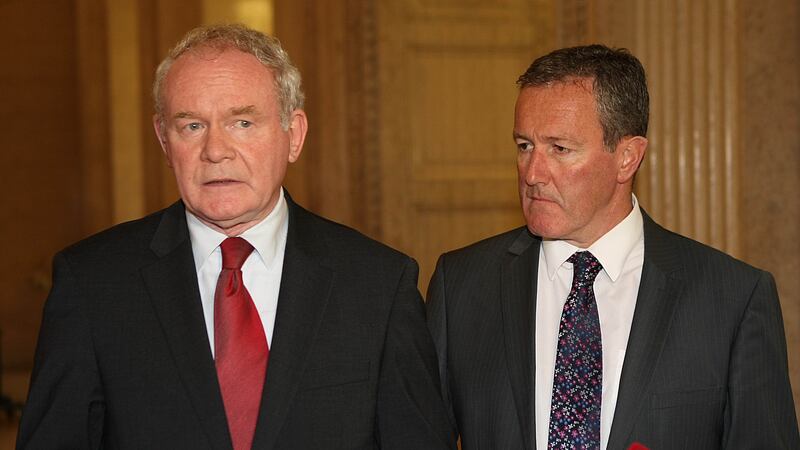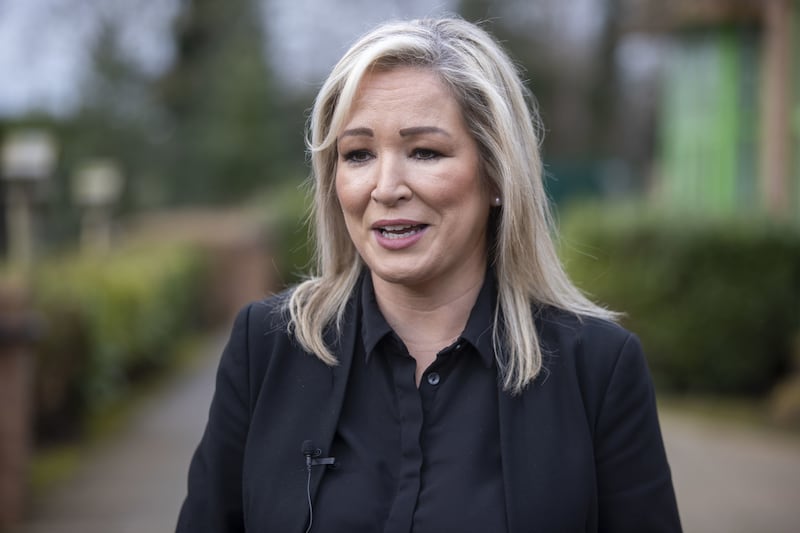THE US administration will receive contrasting assessments of the political crisis in Northern Ireland as both the British government and Sinn Fein travel to Washington for talks.
Secretary of State Theresa Villiers and Sinn Fein Deputy First Minister Martin McGuinness are embarking on separate transatlantic trips to meet senior political figures.
Mr McGuinness is arriving stateside later, with Ms Villiers due in Washington on Tuesday.
The Northern Ireland Office insisted its visit had been scheduled for months, while Sinn Fein said Mr McGuinness was flying to the US in a bid to convince the administration to prevail upon the British Government to change its approach to the Stormont impasse.
Power-sharing in Northern Ireland is in danger of collapse due to a bitter row over welfare implementation, which has been vetoed by Sinn Fein and the SDLP.
Without rolling out the British government's changes to the benefits system, last year's wideranging Stormont House Agreement between the Executive's five parties and the British and Dublin governments is in limbo.
The deadlock has contributed to a black hole in the Executive's budget running to hundreds of millions of pounds.
While initially voicing support for the overall Stormont House Agreement, Sinn Fein later withdrew backing for the welfare reform section - claiming proposed Executive-funded top-up schemes for claimants were not as comprehensive as they envisaged.
The government and the unionist parties have blamed Sinn Fein's stance on welfare for the crisis, while the republican party claims the root of the problem is the government's "austerity agenda".
Ms Villiers said she would be updating members of the US administration, members of Congress and senior figures within the Irish American community.
"The US remains the UK's closest ally and successive administrations, along with many influential individuals, have played important roles in moving the political process in Northern Ireland forward," she said.
"My message over the next three days is clear. The Stormont House Agreement remains the best hope for building a brighter, more secure future for Northern Ireland.
"But for that to happen, the agreement needs to be implemented in full. I will be looking for continued US support for that."
She added: "The government will not finance a more generous welfare system in Northern Ireland than in the rest of the UK.
"Those parties currently blocking welfare reform are simply putting more strain on the Executive's finances with the inevitable consequences that will have for frontline public services.
"All Northern Ireland parties must work to implement the other aspects of the Stormont House Agreement for which they are responsible."
Mr McGuinness said he was meeting the Friends of Ireland caucus on Capitol Hill, the State Department and other senior administration officials.
"The institutions of the Good Friday Agreement, which have underpinned the Irish peace process for almost two decades, are facing crisis," he said.
"This is an extremely grave situation and I would urge all those with a stake in this process to make every effort to find a resolution which secures the power-sharing administration.
"In order to redress this crisis, we require an imaginative and innovative solution, which recognises the particular challenges faced by our administration. That means ensuring the institutions are politically and economically viable and able to meet the needs of a society emerging from a long and bitter conflict.
"To date, that has not been forthcoming from the British government and they need to be persuaded that a new approach is required.
"It is my hope that the US administration - which has been a key ally since the inception of the peace process - can help convince the British government of the gravity of the current situation and to end their current approach which threatens to undermine the incredible progress we have made."
The welfare deadlock has put the rest of the measures contained in the Stormont House accord on hold.
Those include the devolution of corporation tax powers to Belfast, access from the Treasury to £2 billion of additional spending powers, a major civil service redundancy scheme and new institutions to deal with the thorny legacy of the Troubles.








